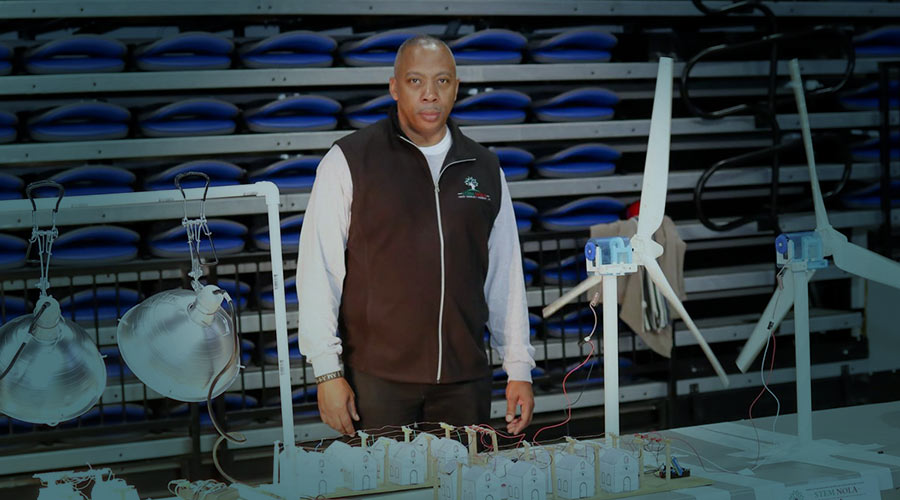This is Robert F. Smith. I’d like to introduce you to Calvin Mackie’s STEM Global Action project. The work is close to my heart as a former chemical engineer and advocate for STEM education and career opportunities.
Former Tulane professor Calvin Mackie started STEM Nola in Louisiana in 2014 because he wanted to share what had inspired him to pursue mechanical engineering, first as a major and then as a career in academia. Now Mackie has gone global, transforming STEM Nola into STEM Global Action, to be specific. But, the mission is the same.
“I went into STEM because it gave me the opportunity to use my critical thinking skills, but it also gave me the freedom of thought,” Mackie told a reporter from The Observer. “I always wanted to create things, see things for what they could be rather than what they were.”
That ability to see potential can be applied to people too, especially students. STEM Global Action is a nonprofit organization working to connect historically underserved communities with STEM (SGA) education opportunities. This means advocating for and helping to provide “state-of-the-art design and delivery of STEM-based activities, programs and events for K-12 students, families and communities,” according to the SGA website.
Diversity in STEM is Still a Problem
- According to the National Science Foundation data released last year, there were 16% fewer Black STEM graduates in 2016 than 2004.
- According to a Pew Research Center report published in April, Black Americans make up only 5% of engineering occupations and 9% of the STEM workforce.
- Self-reported diversity data released in 2020 from major technology companies shows “low single-digit increases” in the percentage of Black employees, according to CNBC.
- Hashtags such as #BlackinTech and #BlackinStem were created on social media to form networks because of the isolation many felt in school and in their careers.
SGA wants to ensure all students have access to hands-on interactive STEM (science, technology, engineering and mathematics) experiences. By gaining skills and confidence, students are freed to think critically and solve problems. This is a skill which learners can apply no matter their future paths.
Of course, it’s Mackie’s hope that SGA programs will help to make STEM learning and careers more diverse. After he earned his doctorate degree in mechanical engineering and began teaching at Tulane University, he told the Observer that he “was isolated.” He was the sole Black professor in his department. He had to contend with bias on campus on a daily basis during his tenure. It didn’t deter him, but it did help inspire the creation of STEM Nola.
From STEM Garage Experiments to a Global Nonprofit
As Mackie tells it, he began engaging his sons with STEM experiments at home in his garage. The whole thing got started when his son, then in 3rd grade, came home from school saying he, “didn’t like science.” Quite a blow for a professor of engineering. He ordered some kits and the experiments commenced. Then more kids wanted to join, and the Mackie family helped finance a community STEM Fest. Now Mackie is running a global nonprofit, licensing his brand of community-centered STEM learning from Illinois to Tanzania in East Africa.
The story might ring a bell for others who were filled with wonder and excitement as they launched their first rockets in backyards or fields with friends. Robert F. Smith, the Founder, Chairman and CEO of Vista Equity Partners recalled a similar experience growing up in his Denver, Colorado neighborhood in the ‘60s and ‘70s. A young neighbor decided to form a rocketry club and taught Smith and other interested kids the basics.
“I think three quarters of the guys who were in this little rocket club became engineers,” Smith said during an interview with Canada’s BlackNorth last year, explaining “we would have had none of that exposure” if it hadn’t been for that neighbor. Smith’s context at the time of the interview was answering a question about how we can give back and what we can do to help our communities. Smith told the group that sometimes the gift of time, patience and knowledge can be even more valuable than money.
And that element of community leadership is the key to SGA’s programs. Mackie is looking for volunteers who want to build rockets or explain the details of oil refinement to hungry young minds.
Community Leadership and STEM
Mackie’s smart model for SGA is to build STEM learning partnerships using existing networks: corporate, volunteer and governmental. By leveraging what is already in place, the model is efficient and a motivated local group can use the infrastructure SGA provides to partner for funding and the volunteers to make things happen.
Creating a network of STEM volunteers, professionals, educators and learners is a benefit to all involved. Professionals and volunteers form networks. Families and science educators are backed up. Students, all students, have access to 21st century skills and tools that are in demand across all industries.
And, each group also gains access to multigenerational learning and mentorship. It cannot be overlooked that the network itself can be as valuable as the technology introduced. How else will the world find the next generation of dreamers, makers and creators who will transform and expand our understanding of science and technology.
Find out how you can get involved with STEM Global Action.






